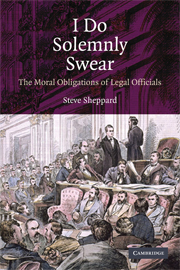Book contents
- Frontmatter
- Contents
- Preface: Moral Officials, Retail Justice, and Three Caveats
- Acknowledgments
- Introduction: Seven Questions about What Is Fit for an Official to Do
- 1 Law and Office
- 2 The Stakes: The Interests of Others in Official Actions
- 3 Officials' Obligations Arise from More Than the Law Alone
- 4 The Moral Obligations of Legal Officials
- 5 Patterns of Relationship between Legal and Moral Obligations
- 6 Breaching Obligations
- 7 Tools for the Trade: Maxims and Fallacies
- Epilogue: What the Official Ought to Do: Law and Justice
- Appendix: Taxonomy of Headings: The Lawes and Libertyes of Massachusetts (Discussed in Chapter 1)
- Index
- References
Introduction: Seven Questions about What Is Fit for an Official to Do
Published online by Cambridge University Press: 05 June 2012
- Frontmatter
- Contents
- Preface: Moral Officials, Retail Justice, and Three Caveats
- Acknowledgments
- Introduction: Seven Questions about What Is Fit for an Official to Do
- 1 Law and Office
- 2 The Stakes: The Interests of Others in Official Actions
- 3 Officials' Obligations Arise from More Than the Law Alone
- 4 The Moral Obligations of Legal Officials
- 5 Patterns of Relationship between Legal and Moral Obligations
- 6 Breaching Obligations
- 7 Tools for the Trade: Maxims and Fallacies
- Epilogue: What the Official Ought to Do: Law and Justice
- Appendix: Taxonomy of Headings: The Lawes and Libertyes of Massachusetts (Discussed in Chapter 1)
- Index
- References
Summary
In the early 1600s, America was young, and England was enjoying the golden age of its common law. This was an important time for what has become the law of the United States. England was in transition from the feudal to the modern order; the economy was driven less by produce from ancestral lands and more by money, trade, colonies, and technology. The monarchy was becoming more bureaucratic, and the English law courts and Parliament, which had long been more independent of the Crown than were their counterparts on the continent, asserted again and again their authority as the guardian of the liberties of the subject. The colonists leaving England for America brought with them these models of state and law and these ideas of legal order.
The great expositor of these ideas was the English lawyer, judge, and parliamentary leader Sir Edward Coke, who had consolidated the powers of the courts and written the case reports and textbook institutes that would be brought to American shores, rooting there a notion of what would later be called the Rule of Law. In one of this notion's first tests, King James I of England asked Coke whether he would submit to hearing the king's opinion before deciding a case. Coke refused, replying he would “do that which should be fit for a judge to do.”
- Type
- Chapter
- Information
- I Do Solemnly SwearThe Moral Obligations of Legal Officials, pp. 1 - 7Publisher: Cambridge University PressPrint publication year: 2009



